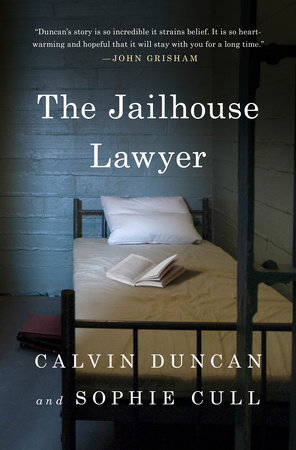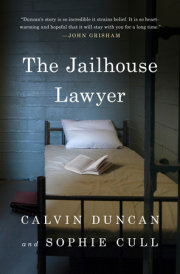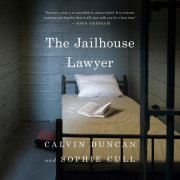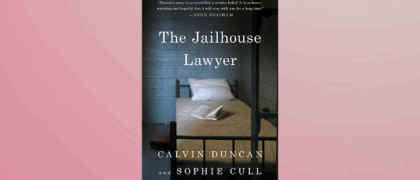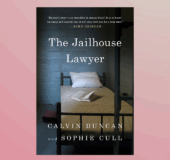Prologue"Whether I shall turn out to be the hero of my own life, or whether that station will be held by anybody else, these pages must show.”
For twenty‑three years, I served as an inmate counsel, or jailhouse lawyer, at Angola prison in Louisiana. I was incarcerated there for a murder I did not commit; I learned the law in its shadow.
For many of those years I taught a law class, and of all the literature I recited to my students from the front of the room, this line from Dickens was the one I quoted most.
I learned it not from reading
David Copperfield, but John Irving’s
The Cider House Rules, a novel about an orphan named Homer Wells who, like me, grew up without any memory of his mother. Like Homer, my and my sister’s efforts to belong in somebody else’s home were largely a failure. From the ages of six and seven, we knew we were on our own, and no help was coming.
As a teenager, it became apparent that my circumstances weren’t going to improve, only my ability to take things I was lacking. I protected my younger sister by stealing food and clothing for her, and getting into fights with boys who paid her too much attention. I stole televisions to make sure I had enough cash to pay my own bond if I got arrested, so I wouldn’t have to call on my aunts. Being a man didn’t mean escaping the streets, only surviving them.
In prison, the notion of being a man narrowed even further. In that environment, the whole goal is to rob you of your concept of self. To the guards, we were children. To the lawyers, we were a means to an end. To the institution, we were a source of job creation. To each other, we were a conquest. Being willing to kill to protect my body from interference—that was being a man.
I was lucky enough to survive that chapter of prison life. At Angola, in the Main Prison, I saw some of the older guys reading books, and I started to wonder if perhaps a man is someone who liberates his mind by reading. So I read Martin Luther King Jr., Dante, and Harper Lee. I spent my time with guys who were focused on helping themselves and helping others. I became friends with Woodfox, Hooks and King, Mwalimu, Gary, Norris, Checo, and Wilbert.
None of us had any realistic chance of getting out of prison at that time. Good conduct wasn’t going to help us. Getting a certificate wasn’t, either. Our fates were sealed. We were all serving life sentences.
But that didn’t stop us from asking the question: What makes a man?
We had come to understand how ludicrous it was that our identities as Black men were reduced to our behinds. No one asked: “What do you stand for?” Or “Are there any rights you have that are worth fighting to protect?” Nobody expected us to live honorable
lives, but we weren’t willing to succumb to that view.
So we helped each other get our education. We taught each other the law. We drafted bills for the legislature and organized our families to support their passage. We invited judges and lawmakers to meet with us at the prison. We published investigative journalism. We led reentry programs. We sent money home to each other’s children. And when miracles happened and some of us started get‑ ting out of Angola, we made sure we never forgot the men we’d left behind.
When I finally made it out of prison, I learned not to talk about it. You realize people don’t want to hear it. Even those of us who were inside together will only mention certain things. We can’t share too openly about our experiences, because we’re still maintaining the version of ourselves that we crafted inside.
A few days after my release, I met a young Australian woman named Sophie, who worked with me at a law office in New Orleans. We were taking trips to Shreveport, Louisiana, to campaign along‑ side churches and civil rights organizations for the removal of a Con‑ federate flag from the local courthouse lawn. On these car rides, I finally found a place where I could talk honestly about my experiences. Sophie asked me about my life in prison and listened to my stories with openness. Having the opportunity to share without being judged helped me take stock of my life. Instead of being Calvin the inmate lawyer, or Calvin the innocent man, or Calvin the orphan, or Calvin the returning citizen, I started to see myself as a man in full. When we decided to work on a book together, we went about it the truest way we knew: my personal account, shared with my friend, who had a deep appreciation of the forces I was up against. If my journey has taught me one thing, it’s that God puts unexpected people in our lives at the moment we need them the most.
We as a society don’t get to hear stories of Black men helping each other. Perhaps if people were allowed to tell, and to hear, such stories, then we would be more inclined to ask why our country devalues Black children the way we do. Why we make a point to figure out if the whales are coming too close to the shore, or if the eagles aren’t hatching enough of their young, or if the bees are dying off, but when it comes to the conditions experienced by Black boys in our neighborhoods, we already seem to know all we need to know.
I want the world to know that a group of Black men, in the darkest place in America—the incarceration capital of the world—rose above our situation to help each other.
May these pages show that it’s the people from whom we expect the least who, in the face of impossible odds, do extraordinary things.
Calvin Duncan
Copyright © 2025 by Calvin Duncan. All rights reserved. No part of this excerpt may be reproduced or reprinted without permission in writing from the publisher.

